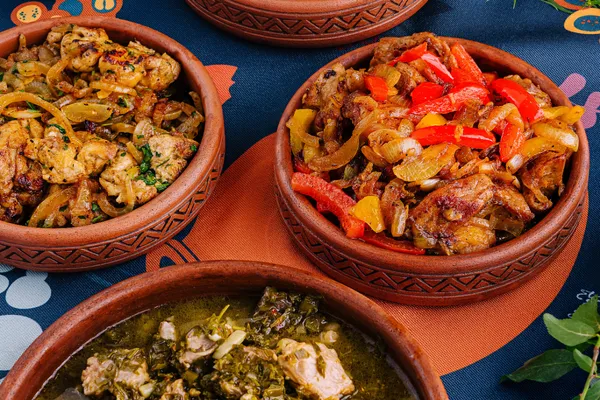
THE BLOG

THE BLOG

Trending Now
Is Hormone Imbalance cramping your style? Take the quiz to see which imbalances may be the culprits for you?

Trending Now
Is Hormone Imbalance cramping your style? Take the quiz to see which imbalances may be the culprits for you?

Culturally-Inclusive Nutrition: Reclaiming Our Health and Heritage

Culturally-Inclusive Nutrition: Reclaiming Our Health and Heritage
Hey, Fam! 👋🏽 Quick questions:
Have you followed every "expert" diet tip just to end up frustrated and hungry? (For my OGs, remember grapefruit and cottage cheese? 😭)
Ever felt like diet culture took more of your joy than what it gave in results? There were times I had the body of my dreams, but my mood was like Carrie White when she turned out that prom!
Hmm...the stories I could tell of struggling with weight since I was a child in the 80's and getting trapped in the diet-culture cycle well into my adulthood.
If reading that made you say "Me too, Gurl!", then kick off your shoes and grab some hibiscus punch because I'm about to break down how to stop the madness.
I'm talking about a foundation to get your healing all the way together – culturally-inclusive nutrition. Eating foods that aren't just good for your body but also connect you to your roots, your culture, and your essence. Imagine embracing the richness of your culinary heritage while at the same time improving your health. Well, imagine no more...because I'm spilling the tea now!
What is Culturally-Inclusive Nutrition?
Culturally-inclusive nutrition means choosing foods that reflect our cultural heritage while promoting health and wellness. It’s about reclaiming traditional foods that have nourished our ancestors for generations, blending ancestral wisdom with modern nutrition science. For sistas who have been stuck in diet culture, this is a game-changer. It’s all about eating foods you grew up loving to truly support your health journey.
Why we need to go back to our roots: Health Disparities Among US Black Women
This is the part where I drop a few facts. Black women in the U.S. face significant health disparities as a result of systemic racism affecting our finances, education, healthcare, access to nutritious food and physical spaces to exercise, along with a host of other contributing factors. A few of these health disparities are:
Obesity: Over 56% of Black women over 20 are obese, compared to 38% of white women (CDC, 2021).
Hypertension: Black women have the highest rates of hypertension in the U.S., impacting nearly 46% (American Heart Association, 2021).
Diabetes: Black women are almost twice as likely to be diagnosed with diabetes compared to white women (CDC, 2021).
Maternal Mortality: Black women are three to four times more likely to die from pregnancy-related causes than white women (CDC, 2020).
These stats aren’t here to frustrate you, but to empower you. Because, Sis, it’s time to transform these numbers through learning to heal ourselves starting with culturally-inclusive nutrition. 🌿✨
Transitioning to a diet that includes more of our ancestral foods can bridge the gap between these alarming health statistics and a more vibrant, healthier future. Traditional foods do not contain added sugars, artificial sweeteners, harmful flavor enhancers, fillers or preservatives in contrast to the Standard American Diet (S.A.D.) that is a major contributor to these disparities. By reconnecting with our ancestral dietary practices, we can create fantabulous meals and a more sustainable and enjoyable approach to health.
How Culturally-Inclusive Nutrition Can Decrease Health Disparities
Connection to Ancestral Wisdom: Traditional diets are rich in whole foods, herbs, and spices that naturally combat inflammation, support gut health, and boost immunity. Your ancestors knew what they were doing and had the health to prove it!
Nutrient Density: Foods like leafy greens, legumes, sweet potatoes, and fatty fish are packed with vitamins, minerals, and antioxidants that can help manage weight, blood pressure, and blood sugar levels.
Cultural Relevance: Eating foods that resonate with your heritage can enhance mental and emotional well-being, making it easier to maintain healthy habits because you actually enjoy the food you're eating.
Now that you understand the power of culturally-inclusive nutrition, let me give you some examples you can use to make it make sense.
Examples of Culturally-Inclusive Nutrition for Black Americans
Leafy Greens: Collard greens, mustard greens, and turnip greens are staples in our kitchens. They're high in fiber, vitamins A, C, and K, and have powerful anti-inflammatory properties.

Legumes: Black-eyed peas, lentils, and chickpeas are fantastic plant-based protein sources that help regulate blood sugar levels.
Root Vegetables: Sweet potatoes and yams are nutrient-dense, rich in beta-carotene, fiber, and antioxidants.
Fish and Seafood: Incorporating fatty fish like wild-caught salmon, sardines and mackerel- rich in omega-3 fatty acids, supports heart health.
Healing Spices: Turmeric, ginger, and garlic not only add flavor but also offer anti-inflammatory and immune-boosting benefits.
Other Sub-Tropical and Tropical Ancestral Foods
Our ancestors thrived on a rich variety of sub-tropical and tropical foods, including:

Plantains: Versatile and nutrient-rich, plantains are a staple in many African, Caribbean, and Latin American diets.
Cassava: A starchy root vegetable that provides essential carbohydrates and can be used in many forms, from boiled to fried to flour.
Mangoes and Papayas: These fruits are not only delicious but also packed with vitamins A and C, fiber, and antioxidants.
Okra: Often used in soups and stews, okra is high in fiber and vitamins C and K.
Coconut: From coconut water to coconut milk and oil, this fruit provides healthy fats, electrolytes, and essential nutrients.

A Taste of Ancestral Wisdom from Kenya: Sukuma Wiki
Let's take a moment to honor a dish that’s a staple in many East African homes – Sukuma Wiki.
I first enjoyed it during a Girls Day at the home of a dear friend while visiting in Kenya. What had really happened was she threw me in the kitchen and told me how to make it, which as intimidating as it may sound, I find is the best way to connect with another culture. 🫶🏽
The name "Sukuma Wiki" is Swahili for "stretch the week," reflecting on how this dish is used to make meals last longer. This delicious, nutritious and budget-friendly dish is primarily made with collard greens or kale, and it's the perfect example of how we can integrate culturally significant foods into our diet. Packed with vitamins, minerals, and fiber, Sukuma Wiki is a true gem of East African cuisine.
Sukuma Wiki Recipe
You didn't think I was gonna tell you about this amazing dish then leave you hanging, did you? This is my way of throwing YOU in the kitchen to get crack-a-lackin’ with a simple, nutritious recipe that honors our culture and nourishes our bodies.
Ingredients:
1 bunch of collard greens or kale (traditionally sukuma wiki is made with collard greens), washed and chopped
2 tablespoons olive oil
1 onion, chopped
2 Roma tomatoes, chopped
2 cloves garlic, minced
1 green bell pepper, chopped
1 teaspoon turmeric powder
1 teaspoon cumin powder
Salt and pepper to taste
Juice of 1 lemon (optional)
Instructions:
In a large skillet or pot, heat the olive oil over medium heat. Add the onion and garlic, sautéing until translucent.
Add the green bell pepper and cook for another 2-3 minutes until slightly softened.
Add the tomatoes, turmeric, and cumin powder. Cook until the tomatoes are soft and the spices are fragrant. Take care to frequently stir the pot so the spices don't burn.
Add the chopped collard greens, stirring to combine. Cook for about 10 minutes, stirring frequently, until the greens are tender but still vibrant green and the liquid the greens released has reduced to half.
Season with salt, pepper, and lemon juice to taste.
Serve hot as a side dish to a protein of your choice or over a bed of your favorite rice, boiled sweet potato or yam. Then do the ancestors proud and enjoy your most soulful and healing meal!
Final Thoughts
As Black women, it's long past time we returned to our roots and learned to heal ourselves. By embracing our ancestral foods, we can combat the health disparities that have plagued our communities for too long. Remember, we are our ancestors’ wildest dreams. Let’s honor them by nurturing our bodies and reclaiming our health so we and our future generations can thrive.
Blessings and Healing! 🙏🏽🧘🏽♀️

Other resources to help you heal yourself:
🌿 DITCH SUGAR ADDICTION: A free PDF guide to help you find hidden sugars and add more foods to your diet that help you beat sugar cravings.
🧘🏽♀️ GIRL, HEAL YOURSELF! GROUP COACHING: Say PEACE OUT ✌🏽 to family health issues, feeling the weight of chronic stress, and BS weight loss programs with results that don't last. Journey with us from Scattered Sista to Grounded Goddess in just 8 weeks!
💡 WEEKLY GUIDANCE: Weekly tips, product recommendations and and information to help you stay focused on improving your health and protecting your peace.
💻 ANGELABILLUPS.COM : Stay up to date with my workshops, courses and offerings and how I can best serve you on your journey.
Free Hormone Tips, Recipes and Product Deals sent straight to your phone – Text the word FAMILY to 202-938-2677 to get on my VIP List and never miss a promotion

Feeling Off-Balance? Discover if Hormone Imbalance is Cramping Your Style!
Uncover the hidden signs of hormone imbalances with my expert insights. From fatigue to mood swings, learn to decode your body's messages for better health.
WHO IS ANGELA?

Besides being the Health Coach 4 The Culture, I'm a global traveller, lover of food, culture, animals, big-hearted people and all things wellness. Years of neglecting my own health and misinformation put me on the path to embracing holistic health. Now it's my mission to empower other Black women over 40 to become their own healer and FIRE THIER DR. ASAP!!
If you are here, you are family, so welcome and come on in!
CATEGORIES
FREE RESOURCES
5 DAY MINI-COURSE
KICK YOUR SUGAR CRAVINGS GUIDE
JOIN THE WEEKLY NEWSLETTER
FOLLOW ME ON SOCIAL

Copyright © 2025 Livity Wellness Solutioins LLC | All Rights Reserved.

Culturally-Inclusive Nutrition: Reclaiming Our Health and Heritage

Culturally-Inclusive Nutrition: Reclaiming Our Health and Heritage
Hey, Fam! 👋🏽 Quick questions:
Have you followed every "expert" diet tip just to end up frustrated and hungry? (For my OGs, remember grapefruit and cottage cheese? 😭)
Ever felt like diet culture took more of your joy than what it gave in results? There were times I had the body of my dreams, but my mood was like Carrie White when she turned out that prom!
Hmm...the stories I could tell of struggling with weight since I was a child in the 80's and getting trapped in the diet-culture cycle well into my adulthood.
If reading that made you say "Me too, Gurl!", then kick off your shoes and grab some hibiscus punch because I'm about to break down how to stop the madness.
I'm talking about a foundation to get your healing all the way together – culturally-inclusive nutrition. Eating foods that aren't just good for your body but also connect you to your roots, your culture, and your essence. Imagine embracing the richness of your culinary heritage while at the same time improving your health. Well, imagine no more...because I'm spilling the tea now!
What is Culturally-Inclusive Nutrition?
Culturally-inclusive nutrition means choosing foods that reflect our cultural heritage while promoting health and wellness. It’s about reclaiming traditional foods that have nourished our ancestors for generations, blending ancestral wisdom with modern nutrition science. For sistas who have been stuck in diet culture, this is a game-changer. It’s all about eating foods you grew up loving to truly support your health journey.
Why we need to go back to our roots: Health Disparities Among US Black Women
This is the part where I drop a few facts. Black women in the U.S. face significant health disparities as a result of systemic racism affecting our finances, education, healthcare, access to nutritious food and physical spaces to exercise, along with a host of other contributing factors. A few of these health disparities are:
Obesity: Over 56% of Black women over 20 are obese, compared to 38% of white women (CDC, 2021).
Hypertension: Black women have the highest rates of hypertension in the U.S., impacting nearly 46% (American Heart Association, 2021).
Diabetes: Black women are almost twice as likely to be diagnosed with diabetes compared to white women (CDC, 2021).
Maternal Mortality: Black women are three to four times more likely to die from pregnancy-related causes than white women (CDC, 2020).
These stats aren’t here to frustrate you, but to empower you. Because, Sis, it’s time to transform these numbers through learning to heal ourselves starting with culturally-inclusive nutrition. 🌿✨
Transitioning to a diet that includes more of our ancestral foods can bridge the gap between these alarming health statistics and a more vibrant, healthier future. Traditional foods do not contain added sugars, artificial sweeteners, harmful flavor enhancers, fillers or preservatives in contrast to the Standard American Diet (S.A.D.) that is a major contributor to these disparities. By reconnecting with our ancestral dietary practices, we can create fantabulous meals and a more sustainable and enjoyable approach to health.
How Culturally-Inclusive Nutrition Can Decrease Health Disparities
Connection to Ancestral Wisdom: Traditional diets are rich in whole foods, herbs, and spices that naturally combat inflammation, support gut health, and boost immunity. Your ancestors knew what they were doing and had the health to prove it!
Nutrient Density: Foods like leafy greens, legumes, sweet potatoes, and fatty fish are packed with vitamins, minerals, and antioxidants that can help manage weight, blood pressure, and blood sugar levels.
Cultural Relevance: Eating foods that resonate with your heritage can enhance mental and emotional well-being, making it easier to maintain healthy habits because you actually enjoy the food you're eating.
Now that you understand the power of culturally-inclusive nutrition, let me give you some examples you can use to make it make sense.
Examples of Culturally-Inclusive Nutrition for Black Americans
Leafy Greens: Collard greens, mustard greens, and turnip greens are staples in our kitchens. They're high in fiber, vitamins A, C, and K, and have powerful anti-inflammatory properties.

Legumes: Black-eyed peas, lentils, and chickpeas are fantastic plant-based protein sources that help regulate blood sugar levels.
Root Vegetables: Sweet potatoes and yams are nutrient-dense, rich in beta-carotene, fiber, and antioxidants.
Fish and Seafood: Incorporating fatty fish like wild-caught salmon, sardines and mackerel- rich in omega-3 fatty acids, supports heart health.
Healing Spices: Turmeric, ginger, and garlic not only add flavor but also offer anti-inflammatory and immune-boosting benefits.
Other Sub-Tropical and Tropical Ancestral Foods
Our ancestors thrived on a rich variety of sub-tropical and tropical foods, including:

Plantains: Versatile and nutrient-rich, plantains are a staple in many African, Caribbean, and Latin American diets.
Cassava: A starchy root vegetable that provides essential carbohydrates and can be used in many forms, from boiled to fried to flour.
Mangoes and Papayas: These fruits are not only delicious but also packed with vitamins A and C, fiber, and antioxidants.
Okra: Often used in soups and stews, okra is high in fiber and vitamins C and K.
Coconut: From coconut water to coconut milk and oil, this fruit provides healthy fats, electrolytes, and essential nutrients.

A Taste of Ancestral Wisdom from Kenya: Sukuma Wiki
Let's take a moment to honor a dish that’s a staple in many East African homes – Sukuma Wiki.
I first enjoyed it during a Girls Day at the home of a dear friend while visiting in Kenya. What had really happened was she threw me in the kitchen and told me how to make it, which as intimidating as it may sound, I find is the best way to connect with another culture. 🫶🏽
The name "Sukuma Wiki" is Swahili for "stretch the week," reflecting on how this dish is used to make meals last longer. This delicious, nutritious and budget-friendly dish is primarily made with collard greens or kale, and it's the perfect example of how we can integrate culturally significant foods into our diet. Packed with vitamins, minerals, and fiber, Sukuma Wiki is a true gem of East African cuisine.
Sukuma Wiki Recipe
You didn't think I was gonna tell you about this amazing dish then leave you hanging, did you? This is my way of throwing YOU in the kitchen to get crack-a-lackin’ with a simple, nutritious recipe that honors our culture and nourishes our bodies.
Ingredients:
1 bunch of collard greens or kale (traditionally sukuma wiki is made with collard greens), washed and chopped
2 tablespoons olive oil
1 onion, chopped
2 Roma tomatoes, chopped
2 cloves garlic, minced
1 green bell pepper, chopped
1 teaspoon turmeric powder
1 teaspoon cumin powder
Salt and pepper to taste
Juice of 1 lemon (optional)
Instructions:
In a large skillet or pot, heat the olive oil over medium heat. Add the onion and garlic, sautéing until translucent.
Add the green bell pepper and cook for another 2-3 minutes until slightly softened.
Add the tomatoes, turmeric, and cumin powder. Cook until the tomatoes are soft and the spices are fragrant. Take care to frequently stir the pot so the spices don't burn.
Add the chopped collard greens, stirring to combine. Cook for about 10 minutes, stirring frequently, until the greens are tender but still vibrant green and the liquid the greens released has reduced to half.
Season with salt, pepper, and lemon juice to taste.
Serve hot as a side dish to a protein of your choice or over a bed of your favorite rice, boiled sweet potato or yam. Then do the ancestors proud and enjoy your most soulful and healing meal!
Final Thoughts
As Black women, it's long past time we returned to our roots and learned to heal ourselves. By embracing our ancestral foods, we can combat the health disparities that have plagued our communities for too long. Remember, we are our ancestors’ wildest dreams. Let’s honor them by nurturing our bodies and reclaiming our health so we and our future generations can thrive.
Blessings and Healing! 🙏🏽🧘🏽♀️

Other resources to help you heal yourself:
🌿 DITCH SUGAR ADDICTION: A free PDF guide to help you find hidden sugars and add more foods to your diet that help you beat sugar cravings.
🧘🏽♀️ GIRL, HEAL YOURSELF! GROUP COACHING: Say PEACE OUT ✌🏽 to family health issues, feeling the weight of chronic stress, and BS weight loss programs with results that don't last. Journey with us from Scattered Sista to Grounded Goddess in just 8 weeks!
💡 WEEKLY GUIDANCE: Weekly tips, product recommendations and and information to help you stay focused on improving your health and protecting your peace.
💻 ANGELABILLUPS.COM : Stay up to date with my workshops, courses and offerings and how I can best serve you on your journey.
Free Hormone Tips, Recipes and Product Deals sent straight to your phone – Text the word FAMILY to 202-938-2677 to get on my VIP List and never miss a promotion
WHO IS ANGELA?

Besides being your new Hormone 🧬 Hacking BFF, I'm a global traveller, lover of food, culture, animals, big-hearted people and all things wellness. Years of neglecting my own health and misinformation put me on the path to embracing holistic health. Now it's my mission to empower other ambitious women ditch the diet and grind cultures in order to restore and reclaim their vitality and health.
If you are here, you are family, and you are most welcome!
CATEGORIES
FREE RESOURCES
5 DAY MINI-COURSE
KICK YOUR SUGAR CRAVINGS GUIDE
JOIN EMAIL LIST
FOLLOW ME ON SOCIAL

Copyright © 2025 Livity Wellness Solutions LLC | All Rights Reserved.
